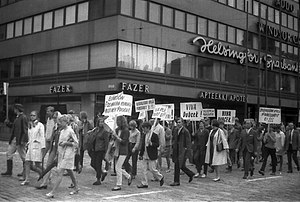 Image via Wikipedia
Image via Wikipedia[posted from Helsinki]
On the night from 20-21 August 1968, troops from the Warsaw Pact (with the exception of Romania) invaded Czechoslovakia in order to put an end to the perceived threat represented by the democratic reforms of the "Prague Spring" and Alexander Dubček's experiment in creating "socialism with a human face."
As the Presidium of the Central Committee of the Communist Party attempted to make sense of the unfolding events, it issued the following declaration just after 1 a.m.
To All the People of the Czechoslovak Socialist Republic:Writer Arnošt Lustig recalled the tense atmosphere of the preceding months and the shock occasioned by the invasion itself:
Yesterday, August 20, 1968, at about 11 p.m., the armies of the Soviet Union, the Polish People's Republic, the German Democratic Republic, the Hungarian People's Republic, and the Bulgarian People's Republic crossed the state borders of the Czechoslovak Socialist Republic. This took place without the knowledge of the President of the Republic, the Presidium of the National Assembly, the Presidium of the Government, and the First Secretary of the Communist Party Central Committee. The Presidium of the Central Committee was then in session, preoccupied with the preparations for the Extraordinary Fourteenth Party Congress. The Presidium calls upon all citizens of the Republic to keep peace and not resist the advancing armies, because the defense of our state borders is now impossible.
For this reason, our army, the Security Forces, and the People's Militia were not given the order to defend the country. The Presidium considers this action [the invasion] to be contrary to the fundamental principles of relations between socialist states and a denial of the basic norms of international law.
All leading officials of the Party and the National Front remain at their posts, to which they were elected as representatives of the people and members of their organizations according to the laws and regulations of the Czechoslovak Socialist Republic. The appropriate constitutional organs have called into session the National Assembly and the Government of the Republic, and the Presidium of the Central Committee is convening the Party Central Committee in order to deal with the situation that has arisen.
(from: The Czech Black Book, Prepared by the Institute of History of the Czechoslovak Academy of Sciences, ed. Robert Littell (NY: Avon Discus Books, 1969, 21-22)
"I did not count on occupation but my wife did. Whenever she heard a car outside the window, she said 'Russians are here', and they finally came. But it was still a shock for me. I thought it had nothing to with socialism. I was in Italy at the time and they invited me to the Central Committee of the Italian Communist Party and asked me what I thought. I said that socialism degraded into fascism and that deeds are proving it. I said they are occupying a brotherly country which really liked them, as Russians, as liberators, and that they betrayed this trust horribly, and that I considered the equal to fascists. From socialism, it went to fascism, from utopia, it went to murder."Although resistance was impossible and the government had earlier asked the US not to intervene on its behalf, for many citizens, the invasion was the humiliating repeat of the Munich Agreement, in which the nation again had to yield to outside hostile force without a fight. For many observers inside and outside the country, the invasion was the less violent but no less ominous pendant to the Soviet crushing of the Hungarian Revolution just over a decade earlier. The intervention resulting from the "Brezhnev Doctrine," declaring that the nations of the east bloc would not be allowed to move backward from what was called "socialism" sent the message that internal reform was henceforth impossible. The misleadingly entitled process of "normalization" in fact concealed a policy of brutal repression. Seventy-two citizens were apparently killed in the invasion, but the real toll came afterwards: some 300,000 citizens emigrated, and dissenters who stayed behind lost jobs and found educational and career opportunities blocked. The crushing of both reform and dissent was in effect the beginning of the "era of stagnation" that lasted until the reforms of Mikhail Gorbachev, who retroactively endorsed the Prague movement as a precursor of his own efforts.
Resources from Radio Praha
• here, a summary of political history
• retrospective (with audio) from 2007, including the recollections by Lustig

No comments:
Post a Comment